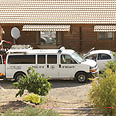
Dangerous slope in West Bank
Terrorist attacks, murder prove that conditions on ground can lead to major eruption of popular terrorism, yet this is not a ‘lite intifada.’ What can security forces, Israeli government do, and what is impact of ‘price tag’ youth?
Similar uncertainty prevails in the attack of nine-year-old Noam Glick, in the settlement of Pisgot. But the truth is that the motivation of the two events is less important than the occurrence. Even if both were criminal acts gone bad, the fact that the Palestinian perpetrators didn’t flee when discovered, but rather murdered or attempted to murder the Jew first encountered, says something.
The significance of this is apparently that the level of unrest in the territories has grown, as well as the motivation to kill a Jew, even if that person is not actually endangering the Palestinian thief. So beyond rage for the murder of three Israelis within a month, and the injury of a nine-year-old girl, a bigger question exists among the Israeli public: are the Palestinian people slowly dragging us down a dangerous slope towards a third intifada? Some experts have estimated that we are in the midst of a "lite intifada.” Here are some signs:
1. An increase last month in what the Shin Bet calls "popular terrorism.” There has been a jump in the number of Molotov cocktails thrown, throwing of stones with the intention of injuring, and at times shooting at passing vehicles. These cases are no longer sporadic, but rather, there is a clear trend of increase in these activities with the intent to harm. As such, a number of Israelis were injured last month, mainly by stone throwing.
2. The Shin Bet and IDF are going out on nightly operations to arrest wanted individuals, in order to thwart attacks. Some alerts are specific, while others are general, but significant in all is orientation and intent. The main goal of attacks with clear targets is the abduction of Israelis with the intent of murdering them and using their bodies as bargaining tools.
3. Recently there have been several cases of violent resistance and at times, live fire, in response to arrest operations carried out by the IDF and Shin Bet. These cases have, for the most part, occurred in refugee camps, in Qalandiya and in Jenin. During gunfights, several Palestinians were killed by security forces’ fire. It may well be that the killing of Palestinians after a long period in which there were no Palestinian casualties raised the level of hatred and motivation to strike back.
These are symptoms of the disease. Now we must examine where they come from, in order to understand whether to expect an increase or decrease of tensions on the ground. There is no doubt that some of the unrest in the West Bank is the result of the distress currently being experienced by the Hamas movement in Gaza, but also in the West Bank. The first issue worrying Hamas are the political negotiations under way between the State of Israel and the people of Abbas. As with the Israeli right, there also prevails among the Hamas an uncertainty regarding the possible results of the negotiations, and they fear this.
Hamas troubles
In addition, Hamas has major trouble in Gaza. Hamas lost the sponsorship of the Egyptian Muslim Brotherhood, and the Egyptian army is closing tunnels and blaming the Hamas leadership, at times even without hard evidence, for the wave of terror sweeping the Sinai Peninsula.
As a result of Egyptian pressure and the economic distress in which it results, Hamas is looking back to Iranian patronage, and this road passes through the West Bank. In Gaza, Hamas is afraid to act for fear of Egyptian response, but in the West Bank, Hamas can use an ancient call that always works on devout Muslims – "save Al-Aqsa."
In this way, there are many Jews who play into the hands of the Hamas, through provocative demonstrations at the Temple Mount, and nationalistic crime which we refer to with the white-washed name of ‘price tagging.’ The call of Hamas leader Khaled Meshaal in Istanbul on Thursday to believers in Judea and Samaria to save Al-Aqsa was meant to earn him a flattering reception during next week’s Tehran trip.
But Hamas is not alone. The Islamic Jihad is also receiving direct instruction from Tehran and cannot operate freely in Gaza, out of fear of an Egyptian or Israeli response, or even both together. So it regularly incites young Muslims in mosques to carry out attacks against Jews, thus justifying the generous support it receives from Iran, even in this current period.
To all of these must be added the fact that the Palestinian security apparatuses operate erratically and at varying levels of effectiveness against terrorism, and, with this is the fact that while the PA does not incite the masses to attack, it also does not condemn the attacks or murders.
The picture emerging from these is that while we are not in the midst of an intifada anymore, and even not in a “lite intifada,” the ground conditions are still ripe for a major eruption of popular terrorism and mass disturbances, which, as we know, have their own dynamics.
The question is whether Israel's security forces or its government can do anything at all different than in the past to stop us from getting pulled down the slippery slope, or should we continue with current practices and policies, while hoping for the best.
One thing is clear: the Jewish contribution to the agitation of the Palestinians can and should be prevented. In this area, the Shin Bet, the Israeli Police and the Israeli government are not doing enough. “Price tag" youth are not guilty of the murders committed by Palestinians, but they must understand that any attack on their part against Israeli security forces, also raises the motivation for similar actions to be carried out by Palestinians.










